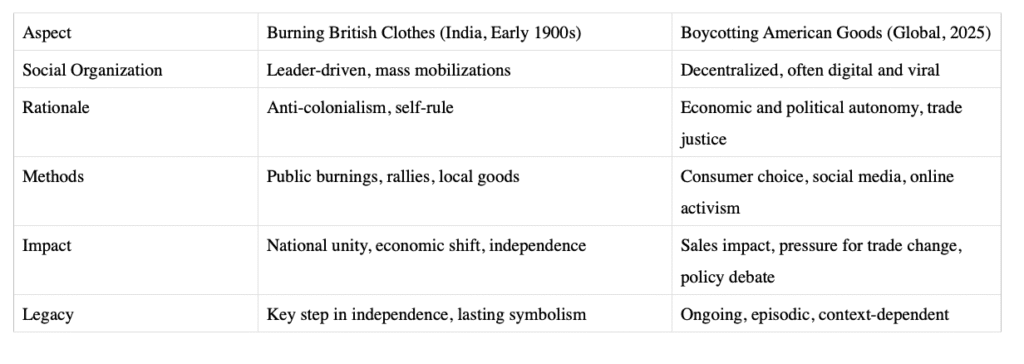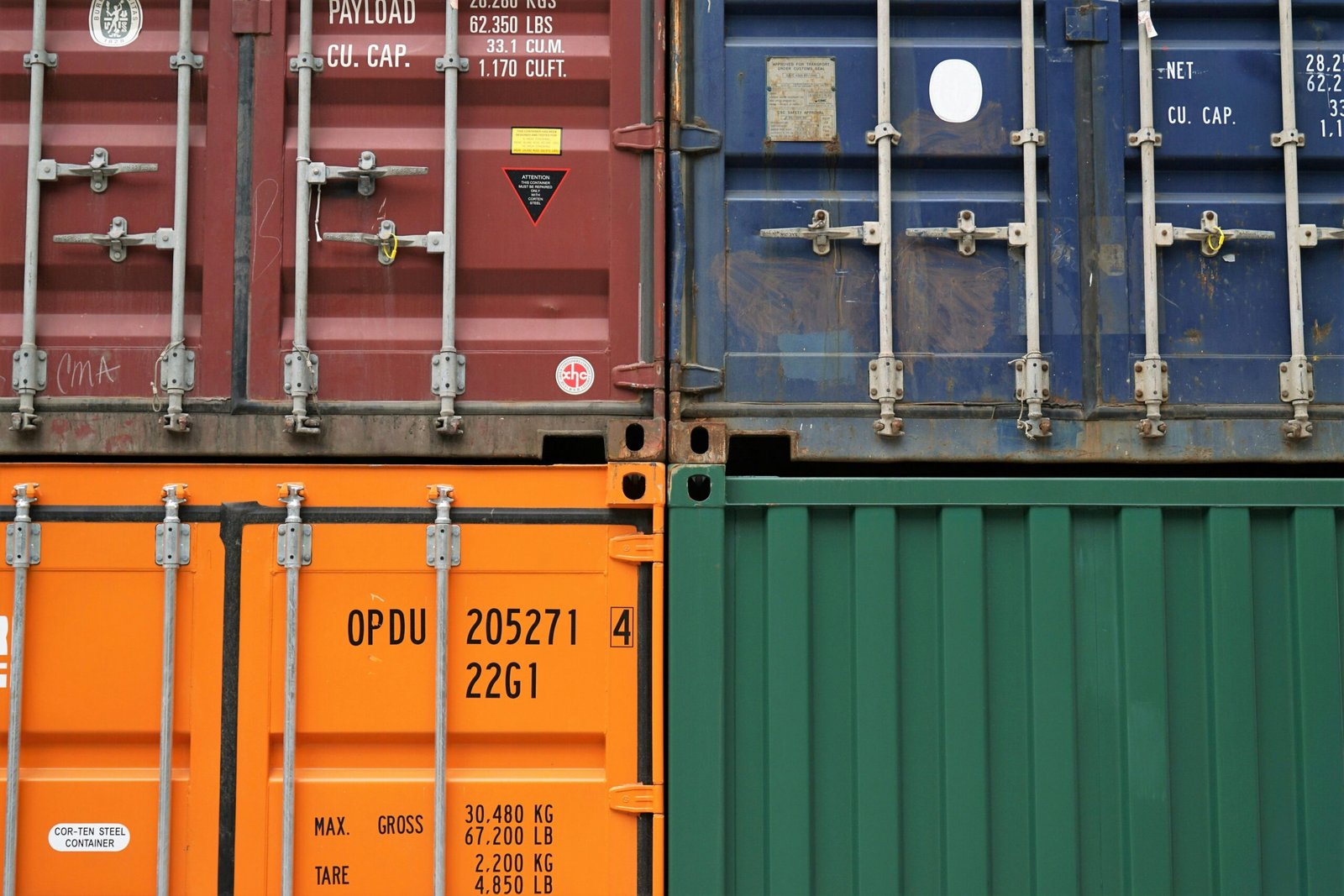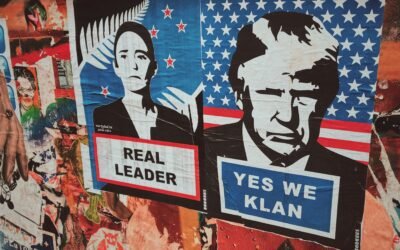Introduction
Acts of consumer protest have long functioned as powerful expressions of political, economic, and social dissent. Two prominent examples offer a compelling comparison: the burning of British clothes during India’s colonial struggle, epitomized by the Swadeshi movement, and the contemporary global boycott of American goods amid rising trade tensions and political disputes. Both periods reveal how collective consumer action can become a forum to articulate grievances, challenge foreign dominance, and push for policy change.
Historical Case Study: Burning British Clothes on Indian Roads
The burning of British clothes in colonial India was a seminal act of the Swadeshi movement initiated in the early 20th century. Its roots lay in the protest against British economic policies and later policies like the partition of Bengal in 1905. Championing self-reliance, Indian leaders such as Mahatma Gandhi urged citizens to boycott British textiles, burn foreign clothes in public ceremonies, and adopt homespun khadi.[1][2][3]

- Symbolic Value: Public burning was more than destruction—it was a visible demonstration of national resolve and a repudiation of British economic and cultural control.
- Social Unity: Large gatherings for these events fostered community solidarity and participation in the independence movement.
- Economic Impact: Boycotts shifted purchasing power away from British manufacturers towards Indian artisans and small-scale producers, harming colonial business revenues and reinforcing the case for self-governance.
- Psychological Influence: These acts became rallying points, instilling pride and a sense of agency among ordinary Indians.
Burning British clothes thus marked a substantive stage in India’s long freedom struggle, where consumption choices were weaponized for political ends and national rebuilding.
Present-Day Parallel: Boycott American Goods
In 2025, boycotts of American goods span regions from Europe to Asia and North America. Factors driving these include trade policies, such as tariffs imposed by the U.S. government, diplomatic frictions, and larger global debates over sovereignty.[4][5][6][7]
- Methods and Media: Unlike the mass rallies and ceremonial burnings of the Swadeshi movement, modern boycotts often use social media, viral campaigns, boycott apps, and marketplaces focused on local or non-American brands.
- Scale and Spread: Campaigns are decentralized, frequently organized by consumers, political groups, and activists rather than national leaders.
- Economic Effects: American companies face sales drops in affected regions; products like Californian wines, Coca-Cola, and Netflix subscriptions have recorded measurable declines.[6][8]
- Nationalist and Economic Rhetoric: The arguments echo Swadeshi logic—buy local, resist economic domination, and preserve cultural or political autonomy.
- Indian Context: In India, tariff disputes have triggered calls to revive Swadeshi-era boycott spirit as a bargaining chip against U.S. trade measures, with lawmakers and social commentators urging citizens to shun American brands until policies are reassessed.[7][9][10]
Points of Comparison

What Could Boycotting Lead To?
Boycotts are more than symbolic gestures—they have tangible potential for change:
- Economic Pressure on Foreign Firms: Sustained reduction in sales can push companies to lobby governments for policy change or compromise.
- Reappraisal and Reduction of Tariffs: If American exporters and manufacturers face significant commercial setbacks, internal pressures could mount for Washington to reassess or dial down aggressive tariff measures, seeking diplomatic solutions to stabilize trade.[5][11][6]
- Boost to Local Industries: As consumers substitute American products with domestic alternatives, local industries receive a boost in confidence and market share, reminiscent of the Swadeshi transformation in India’s textile economy.[3]
- Global Dialogue: High-visibility boycotts can trigger cross-border debates on fair trade, sovereignty, and mutual respect, nudging governments toward negotiation rather than confrontation.
- Cultural Realignment: Just as the Swadeshi movement altered fashion and purchasing habits in India, current boycotts could prompt more lasting changes in consumption patterns, valuing local heritage and economic independence.
Conclusion
Both the burning of British cloth in colonial India and the present-day boycott of American goods are acts imbued with far more significance than consumer choice alone. They represent collective action in the quest for autonomy, dignity, and fair economic dealings. History shows that such movements, if sustained and widely adopted, can truly alter the economic landscape—forcing a reconsideration of tariffs, reshaping industries, and opening new channels for negotiation. In India and beyond, the echoes of Swadeshi live on, reminding us that the marketplace can be a stage for profound political drama, with the power to re-balance relations between nations.[10][3][6][7]
Sources
- http://indianculture.gov.in/digital-district-repository/district-repository/burning-foreign-clothes-umreth-1921
- https://timesofindia.indiatimes.com/blogs/paper-cut/buy-british-huh-mahatma-gandhi-is-having-the-last-laugh/
- https://www.vedantu.com/general-knowledge/swadeshi-movement
- https://en.wikipedia.org/wiki/2025_United_States_boycott
- https://edition.cnn.com/2025/03/24/europe/europe-american-boycott-cmd-intl
- https://www.cnbc.com/2025/07/22/how-canadian-boycotts-are-impacting-the-us.html
- https://www.indiatoday.in/india/story/what-if-indians-boycott-american-firms-aap-mp-writes-to-trump-over-tariffs-2768001-2025-08-07
- https://economictimes.com/news/international/global-trends/us-news-denmark-greenland-boycotts-us-products-netflix-californian-wine-no-coca-cola-netflix-or-pringles-us-boycott-fever-spreads-to-this-territory-amid-trumps-constant-threats/articleshow/119752676.cms
- https://www.indiatoday.in/india/story/once-loved-trump-now-faces-backlash-on-indian-internet-over-trade-tariffs-2767940-2025-08-07
- https://www.hindustantimes.com/india-news/what-if-indians-boycott-american-firms-aap-mp-ashok-mittal-lpu-firm-open-letter-to-donald-trump-over-50-tariffs-101754575431138.html
- https://theconversation.com/consumers-are-boycotting-us-goods-around-the-world-should-trump-be-worried-253389



Well researched, though I would may not agree to a few of your points.
That’s alright sir!
We all have our own opinions, what matters is learning from each other